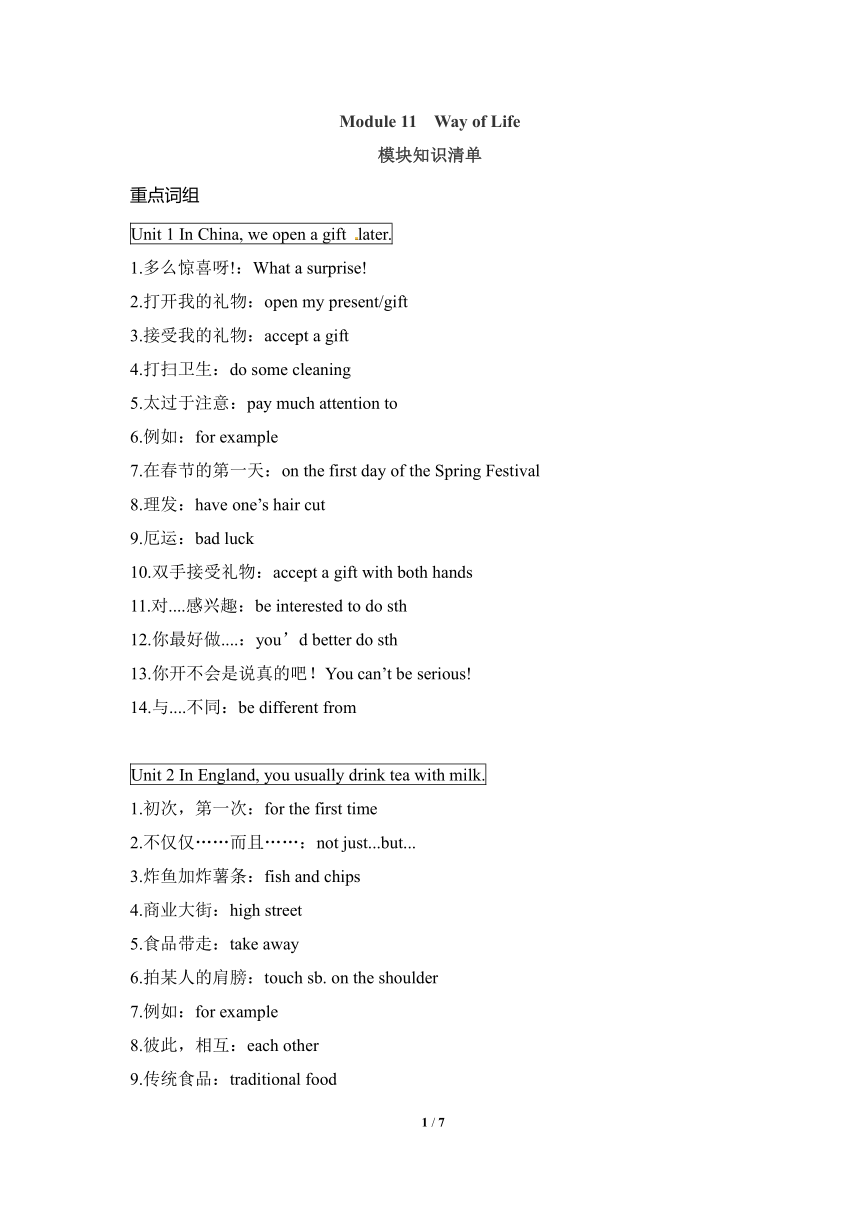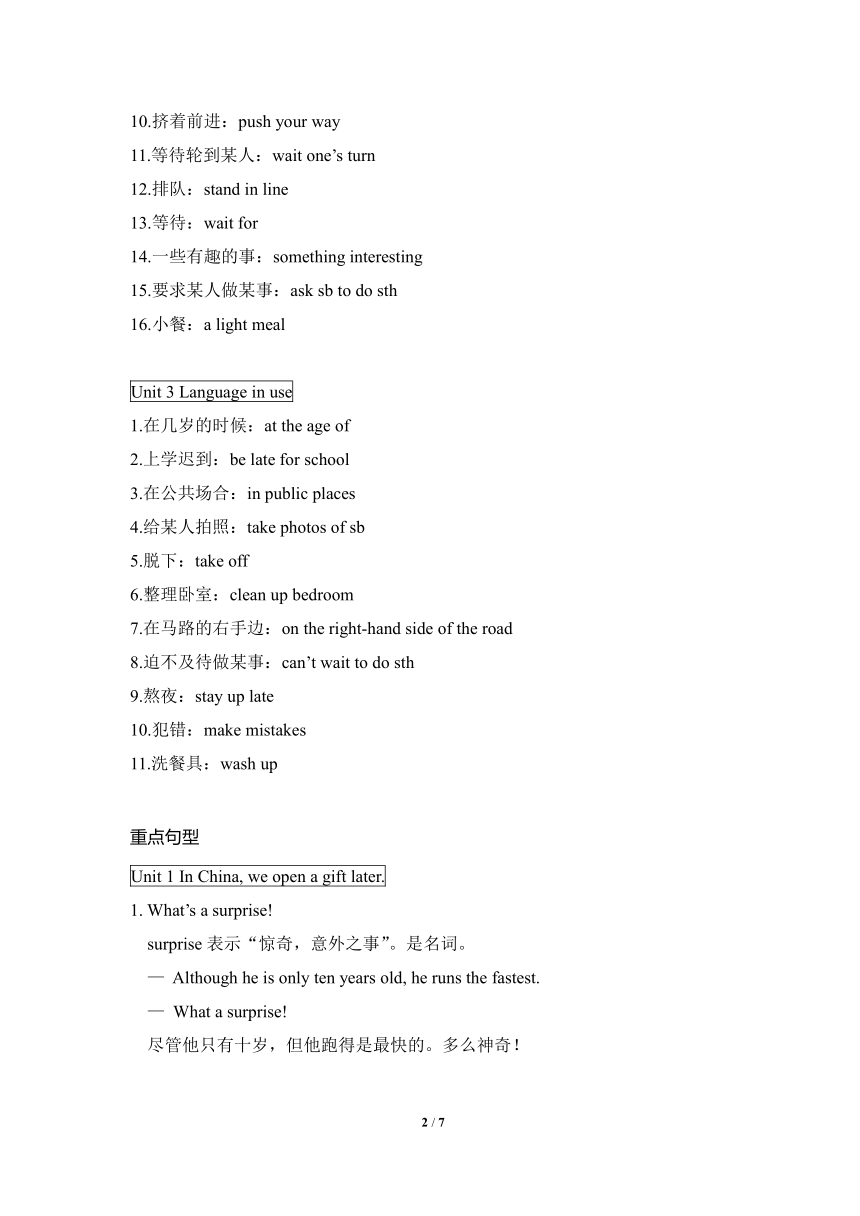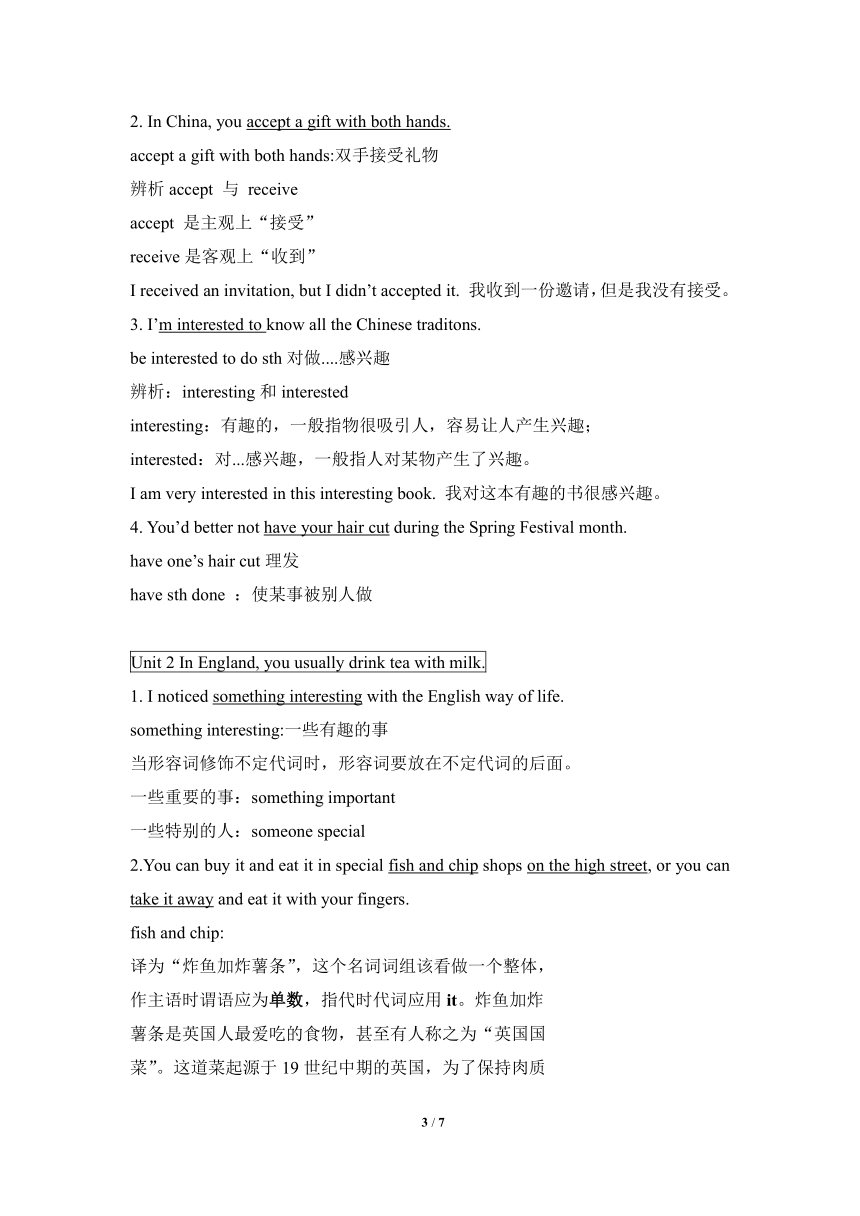外研版八年级英语上册Module 11 Way of life 模块知识清单
文档属性
| 名称 | 外研版八年级英语上册Module 11 Way of life 模块知识清单 |  | |
| 格式 | doc | ||
| 文件大小 | 75.0KB | ||
| 资源类型 | 教案 | ||
| 版本资源 | 外研版 | ||
| 科目 | 英语 | ||
| 更新时间 | 2022-06-25 17:42:52 | ||
图片预览



文档简介
Module 11 Way of Life
模块知识清单
重点词组
Unit 1 In China, we open a gift later.
1.多么惊喜呀!:What a surprise!
2.打开我的礼物:open my present/gift
3.接受我的礼物:accept a gift
4.打扫卫生:do some cleaning
5.太过于注意:pay much attention to
6.例如:for example
7.在春节的第一天:on the first day of the Spring Festival
8.理发:have one’s hair cut
9.厄运:bad luck
10.双手接受礼物:accept a gift with both hands
11.对....感兴趣:be interested to do sth
12.你最好做....:you’d better do sth
13.你开不会是说真的吧!You can’t be serious!
14.与....不同:be different from
Unit 2 In England, you usually drink tea with milk.
1.初次,第一次:for the first time
2.不仅仅……而且……:not just...but...
3.炸鱼加炸薯条:fish and chips
4.商业大街:high street
5.食品带走:take away
6.拍某人的肩膀:touch sb. on the shoulder
7.例如:for example
8.彼此,相互:each other
9.传统食品:traditional food
10.挤着前进:push your way
11.等待轮到某人:wait one’s turn
12.排队:stand in line
13.等待:wait for
14.一些有趣的事:something interesting
15.要求某人做某事:ask sb to do sth
16.小餐:a light meal
Unit 3 Language in use
1.在几岁的时候:at the age of
2.上学迟到:be late for school
3.在公共场合:in public places
4.给某人拍照:take photos of sb
5.脱下:take off
6.整理卧室:clean up bedroom
7.在马路的右手边:on the right-hand side of the road
8.迫不及待做某事:can’t wait to do sth
9.熬夜:stay up late
10.犯错:make mistakes
11.洗餐具:wash up
重点句型
Unit 1 In China, we open a gift later.
1. What’s a surprise!
surprise表示“惊奇,意外之事”。是名词。
— Although he is only ten years old, he runs the fastest.
— What a surprise!
尽管他只有十岁,但他跑得是最快的。多么神奇!
2. In China, you accept a gift with both hands.
accept a gift with both hands:双手接受礼物
辨析accept 与 receive
accept 是主观上“接受”
receive是客观上“收到”
I received an invitation, but I didn’t accepted it. 我收到一份邀请,但是我没有接受。
3. I’m interested to know all the Chinese traditons.
be interested to do sth对做....感兴趣
辨析:interesting和interested
interesting:有趣的,一般指物很吸引人,容易让人产生兴趣;
interested:对...感兴趣,一般指人对某物产生了兴趣。
I am very interested in this interesting book. 我对这本有趣的书很感兴趣。
4. You’d better not have your hair cut during the Spring Festival month.
have one’s hair cut理发
have sth done :使某事被别人做
Unit 2 In England, you usually drink tea with milk.
1. I noticed something interesting with the English way of life.
something interesting:一些有趣的事
当形容词修饰不定代词时,形容词要放在不定代词的后面。
一些重要的事:something important
一些特别的人:someone special
2.You can buy it and eat it in special fish and chip shops on the high street, or you can take it away and eat it with your fingers.
fish and chip:
译为“炸鱼加炸薯条”,这个名词词组该看做一个整体,作主语时谓语应为单数,指代时代词应用it。炸鱼加炸薯条是英国人最爱吃的食物,甚至有人称之为“英国国菜”。这道菜起源于19世纪中期的英国,为了保持肉质的鲜美,人们将鱼裹上美味的浆粉进行炸制,同时配上炸薯条。现在这道菜也流行于澳大利亚、美国等国家。
the high street:指一个城镇的繁华的商业大街或主街。在大城市,每一个区域都有自己的“高街”,比如伦敦的Oxford Street(牛津街)、纽约的42nd Street(42号大街),还有我国大城市的繁华商业街,如北京的西单和王府井、上海的淮海路和南京路等。
take away : 打包带走。
—Would you eat it here or take it away 您是在这吃还是带走?
—I'll take it away. 带走。
因此在英国,外卖食品被称为“takeaway”。
3. Once I noticed a gentleman touch a young man on the shoulder ...
有一次我看到一位先生拍了拍一位年轻人的肩膀……
touch sb. on the shoulder 表示“拍某人的肩膀”,是英语的惯用表达,其他类似的表达例子 pat sb. on the head 拍某人的头
kick sb. in the leg 踢某人的腿
Unit 3 Language in use
1. It is important to know what you must and must not do when you meet people from a different country.
It’s + adj. + (for + sb. )+ to do 做某事(对某人来说)怎么样
注意:在这个句型中,it是形式主语,后面的不定时(to do)是真正的主语。这一句型中常用的形容词有good, bad, important(重要的),necessary(必要的),difficult(困难的),easy(容易的),hard(艰难的),dangerous(危险的),safe(安全的),useful(有益的),pleasant(舒适的),interesting( 有趣的),impossible(不可能的)等。例如,
It’s not easy for them to learn a foreign language.
=To learn a foreign language is not easy for them.
2. It's careless of her to make such mistake. 她犯这样的错误真是太粗心了。
It’s +adj.+of+sb.+不定式 表示“某人(做某事)怎么样”
注意:这一句型中常用描述行为者的性格、品质的形容词,如good( 好的),kind(友善的),nice(友好的),polite(有礼貌的),clever(聪明的),foolish(愚蠢的),lazy(懒惰的),careful(细心的),careless(粗心的),right(正确的),wrong(错误的)等。
It’s very rude of her to say such words.(=She is very rude to say such words.)
注:of sb. 与 for sb. 区别:
It’s + adj.+ of+ sb. + to do sth. 句型可以转化为“sb. + be + adj.+ to do sth.”; 而for sb. 句型则不可以。
It’s very kind you to help me.
It’s necessary you to get to school on time.
It’s foolish him to go alone.
It’s very important students to listen to teachers carefully.
3. When you go to a foreign country, it is always best to check what people usually do so you do not make mistakes.当你去国外时,你最好打探好人们的日常行为习惯,那样就不会犯错。
It is always best to do sth: 最好做某事,类似于:You’d better do sth.
make a mistake : 犯错
4.This is all new to me , so let me know if I make a mistake .
这是我的第一次,所以错了请告诉我。
new to sb:表示某人第一次接触某事。
重点语法点
语法:情态动词
can (could)
① 表示能力(could表示过去的能力) He can speak a little English.
② 表示猜测(一般用否定)
That can not be our English teacher, because she has gone to Shanghai .
③ 表示请求或允许(could更委婉)
Can you pass me the books 你能给我递一下书吗?
Could you help me, please 请问,你能帮助我吗?
Yes, I can. (否定答语可用No, I'm afraid not.)
2. must/mustn’t
① 表示义务、必要或命令 :I must finish my work today.我今天必须完成我的工作。
② 表示推测“肯定,一定” They must be at home. The light is on.
③ 否定时表示 “禁止” You mustn’t smoke here.
注意:must开头的疑问句,其否定回答通常用 don‘t have to 或needn’t 。而不用mustn't。
---Must I finish my homework first
--- Yes, you must.
--- No, you don't have to/ needn't.
may (might)
①表示请求或允许: May I go home,please
Yes, you may. / No, you mustn’t / you can’t.
注意:(1)以may(表许可或请求)开头的一般疑问句,
肯定回答用may, 否定回答mustn't或can't.
(2)在疑问句中不用于第二人称
② 表示可能性 :You may be right.
注意:might为may的过去式,但也可以代替may,语气较为婉转客气或更加不肯定。
③ may 放在肯定句句首表祝愿: May you succeed! 祝你成功!
4.need 需要,既可以做情态动词, 也可以做实意动词
① 情态动词 (need do sth) I need buy a big house.
Need I buy a big house
-- Yes, you must.
-- No, you needn’t / don’t have to. (不必要)
② 实意动词 need sth.: need a bike to go to school. 我上学需要一辆自行车
need to do:He needs to buy a big house.
need doing = need to be done 主动表被动:The flowers need watering.
5. had better的用法
① had better表示劝告或建议,意为“最好……”。
You’d better speak in a low voice.你最好低点说话。
② had better一般不用于疑问句中,但可用于否定句中,其否定形式为:had better not.
You’d better not go out before you finish your homework.
在完成你的家庭作业之前,最好不要出去。
6. 比较 have to 和must
① 两词都是“必须”的意思,have to 表示客观的需要,must 表示说话人主观上的看法,既主观上的必要。
My brother was very ill, so I had to call the doctor in the middle of the night.
我弟弟病得很厉害,我只得半夜里把医生请来。(客观上需要做这件事)
He said that they must work hard.他说他们必须努力工作。(主观上要做这件事)
② have to 有人称、数、时态的变化,而must 只有一种形。
He had to look after his sister yesterday.
③ 在否定结构中:don’t have to 表示“不必”;mustn’t 表示“禁止”。
You don’t have to tell him about it. 你不一定要把此事告诉他。
You mustn’t tell him about it. 你一定不要把这件事告诉他。
2 / 2
模块知识清单
重点词组
Unit 1 In China, we open a gift later.
1.多么惊喜呀!:What a surprise!
2.打开我的礼物:open my present/gift
3.接受我的礼物:accept a gift
4.打扫卫生:do some cleaning
5.太过于注意:pay much attention to
6.例如:for example
7.在春节的第一天:on the first day of the Spring Festival
8.理发:have one’s hair cut
9.厄运:bad luck
10.双手接受礼物:accept a gift with both hands
11.对....感兴趣:be interested to do sth
12.你最好做....:you’d better do sth
13.你开不会是说真的吧!You can’t be serious!
14.与....不同:be different from
Unit 2 In England, you usually drink tea with milk.
1.初次,第一次:for the first time
2.不仅仅……而且……:not just...but...
3.炸鱼加炸薯条:fish and chips
4.商业大街:high street
5.食品带走:take away
6.拍某人的肩膀:touch sb. on the shoulder
7.例如:for example
8.彼此,相互:each other
9.传统食品:traditional food
10.挤着前进:push your way
11.等待轮到某人:wait one’s turn
12.排队:stand in line
13.等待:wait for
14.一些有趣的事:something interesting
15.要求某人做某事:ask sb to do sth
16.小餐:a light meal
Unit 3 Language in use
1.在几岁的时候:at the age of
2.上学迟到:be late for school
3.在公共场合:in public places
4.给某人拍照:take photos of sb
5.脱下:take off
6.整理卧室:clean up bedroom
7.在马路的右手边:on the right-hand side of the road
8.迫不及待做某事:can’t wait to do sth
9.熬夜:stay up late
10.犯错:make mistakes
11.洗餐具:wash up
重点句型
Unit 1 In China, we open a gift later.
1. What’s a surprise!
surprise表示“惊奇,意外之事”。是名词。
— Although he is only ten years old, he runs the fastest.
— What a surprise!
尽管他只有十岁,但他跑得是最快的。多么神奇!
2. In China, you accept a gift with both hands.
accept a gift with both hands:双手接受礼物
辨析accept 与 receive
accept 是主观上“接受”
receive是客观上“收到”
I received an invitation, but I didn’t accepted it. 我收到一份邀请,但是我没有接受。
3. I’m interested to know all the Chinese traditons.
be interested to do sth对做....感兴趣
辨析:interesting和interested
interesting:有趣的,一般指物很吸引人,容易让人产生兴趣;
interested:对...感兴趣,一般指人对某物产生了兴趣。
I am very interested in this interesting book. 我对这本有趣的书很感兴趣。
4. You’d better not have your hair cut during the Spring Festival month.
have one’s hair cut理发
have sth done :使某事被别人做
Unit 2 In England, you usually drink tea with milk.
1. I noticed something interesting with the English way of life.
something interesting:一些有趣的事
当形容词修饰不定代词时,形容词要放在不定代词的后面。
一些重要的事:something important
一些特别的人:someone special
2.You can buy it and eat it in special fish and chip shops on the high street, or you can take it away and eat it with your fingers.
fish and chip:
译为“炸鱼加炸薯条”,这个名词词组该看做一个整体,作主语时谓语应为单数,指代时代词应用it。炸鱼加炸薯条是英国人最爱吃的食物,甚至有人称之为“英国国菜”。这道菜起源于19世纪中期的英国,为了保持肉质的鲜美,人们将鱼裹上美味的浆粉进行炸制,同时配上炸薯条。现在这道菜也流行于澳大利亚、美国等国家。
the high street:指一个城镇的繁华的商业大街或主街。在大城市,每一个区域都有自己的“高街”,比如伦敦的Oxford Street(牛津街)、纽约的42nd Street(42号大街),还有我国大城市的繁华商业街,如北京的西单和王府井、上海的淮海路和南京路等。
take away : 打包带走。
—Would you eat it here or take it away 您是在这吃还是带走?
—I'll take it away. 带走。
因此在英国,外卖食品被称为“takeaway”。
3. Once I noticed a gentleman touch a young man on the shoulder ...
有一次我看到一位先生拍了拍一位年轻人的肩膀……
touch sb. on the shoulder 表示“拍某人的肩膀”,是英语的惯用表达,其他类似的表达例子 pat sb. on the head 拍某人的头
kick sb. in the leg 踢某人的腿
Unit 3 Language in use
1. It is important to know what you must and must not do when you meet people from a different country.
It’s + adj. + (for + sb. )+ to do 做某事(对某人来说)怎么样
注意:在这个句型中,it是形式主语,后面的不定时(to do)是真正的主语。这一句型中常用的形容词有good, bad, important(重要的),necessary(必要的),difficult(困难的),easy(容易的),hard(艰难的),dangerous(危险的),safe(安全的),useful(有益的),pleasant(舒适的),interesting( 有趣的),impossible(不可能的)等。例如,
It’s not easy for them to learn a foreign language.
=To learn a foreign language is not easy for them.
2. It's careless of her to make such mistake. 她犯这样的错误真是太粗心了。
It’s +adj.+of+sb.+不定式 表示“某人(做某事)怎么样”
注意:这一句型中常用描述行为者的性格、品质的形容词,如good( 好的),kind(友善的),nice(友好的),polite(有礼貌的),clever(聪明的),foolish(愚蠢的),lazy(懒惰的),careful(细心的),careless(粗心的),right(正确的),wrong(错误的)等。
It’s very rude of her to say such words.(=She is very rude to say such words.)
注:of sb. 与 for sb. 区别:
It’s + adj.+ of+ sb. + to do sth. 句型可以转化为“sb. + be + adj.+ to do sth.”; 而for sb. 句型则不可以。
It’s very kind you to help me.
It’s necessary you to get to school on time.
It’s foolish him to go alone.
It’s very important students to listen to teachers carefully.
3. When you go to a foreign country, it is always best to check what people usually do so you do not make mistakes.当你去国外时,你最好打探好人们的日常行为习惯,那样就不会犯错。
It is always best to do sth: 最好做某事,类似于:You’d better do sth.
make a mistake : 犯错
4.This is all new to me , so let me know if I make a mistake .
这是我的第一次,所以错了请告诉我。
new to sb:表示某人第一次接触某事。
重点语法点
语法:情态动词
can (could)
① 表示能力(could表示过去的能力) He can speak a little English.
② 表示猜测(一般用否定)
That can not be our English teacher, because she has gone to Shanghai .
③ 表示请求或允许(could更委婉)
Can you pass me the books 你能给我递一下书吗?
Could you help me, please 请问,你能帮助我吗?
Yes, I can. (否定答语可用No, I'm afraid not.)
2. must/mustn’t
① 表示义务、必要或命令 :I must finish my work today.我今天必须完成我的工作。
② 表示推测“肯定,一定” They must be at home. The light is on.
③ 否定时表示 “禁止” You mustn’t smoke here.
注意:must开头的疑问句,其否定回答通常用 don‘t have to 或needn’t 。而不用mustn't。
---Must I finish my homework first
--- Yes, you must.
--- No, you don't have to/ needn't.
may (might)
①表示请求或允许: May I go home,please
Yes, you may. / No, you mustn’t / you can’t.
注意:(1)以may(表许可或请求)开头的一般疑问句,
肯定回答用may, 否定回答mustn't或can't.
(2)在疑问句中不用于第二人称
② 表示可能性 :You may be right.
注意:might为may的过去式,但也可以代替may,语气较为婉转客气或更加不肯定。
③ may 放在肯定句句首表祝愿: May you succeed! 祝你成功!
4.need 需要,既可以做情态动词, 也可以做实意动词
① 情态动词 (need do sth) I need buy a big house.
Need I buy a big house
-- Yes, you must.
-- No, you needn’t / don’t have to. (不必要)
② 实意动词 need sth.: need a bike to go to school. 我上学需要一辆自行车
need to do:He needs to buy a big house.
need doing = need to be done 主动表被动:The flowers need watering.
5. had better的用法
① had better表示劝告或建议,意为“最好……”。
You’d better speak in a low voice.你最好低点说话。
② had better一般不用于疑问句中,但可用于否定句中,其否定形式为:had better not.
You’d better not go out before you finish your homework.
在完成你的家庭作业之前,最好不要出去。
6. 比较 have to 和must
① 两词都是“必须”的意思,have to 表示客观的需要,must 表示说话人主观上的看法,既主观上的必要。
My brother was very ill, so I had to call the doctor in the middle of the night.
我弟弟病得很厉害,我只得半夜里把医生请来。(客观上需要做这件事)
He said that they must work hard.他说他们必须努力工作。(主观上要做这件事)
② have to 有人称、数、时态的变化,而must 只有一种形。
He had to look after his sister yesterday.
③ 在否定结构中:don’t have to 表示“不必”;mustn’t 表示“禁止”。
You don’t have to tell him about it. 你不一定要把此事告诉他。
You mustn’t tell him about it. 你一定不要把这件事告诉他。
2 / 2
同课章节目录
- Module 1 How to learn English
- Unit 1 Let's try to speak English as much as possi
- Unit 2 You should smile at her.
- Unit 3 Language in use .
- Module 2 My home town and my country
- Unit 1 It's taller than many other buildings.
- Unit 2 Cambridge is a beautiful city in the east o
- Unit 3 Language in use .
- Module 3 Sports.
- Unit 1 Nothing is more exciting than playing tenni
- Unit 2 This year we training more carefully.
- Unit 3 Language in use .
- Module 4 Planes, ships and trains .
- Unit 1 He lives the farthest from school.
- Unit 2 What is the best way to travel.
- Unit 3 Language in use .
- Module 5 Lao She Teahouse.
- Unit 1 I wanted to see the Beijing Opera.
- Unit 2 It descibes the changes in Chinese society.
- Unit 3 Language in use .
- Module 6 Animals in danger.
- Unit 1 It allows people to get closer to them .
- Unit 2 The WWF is working hard to save them all.
- Unit 3 Language in use .
- Revision module A
- Module 7 A famous story
- Unit 1 Alice was sitting with her sister by the ri
- Unit 2 She was thinking about her cat.
- Unit 3 Language in use .
- Module 8 Accidents
- Unit 1 While the car were changing to red, a car s
- Unit 2 I was trying to pick it up when it bite me
- Unit 3 Language in use .
- Module 9 Population
- Unit 1 The population of China is about 1.37 billi
- Unit 2 Arnwick was a city with 200,000 people.
- Unit 3 Language in use .
- Module 10 The weathe
- Unit 1 It might snow.
- Unit 2 The weather is fine all year round.
- Unit 3 Language in use .
- Module 11 Way of life
- Unit 1 In China ,we open a gift later.
- Unit 2 In England, you usually drink tea with milk
- Unit 3 Language in use .
- Module 12 Help
- Unit 1 What should we do before help arrives?
- Unit 2 Stay away from windows and heavy furniture.
- Unit 3 Language in use .
- Revision module B
